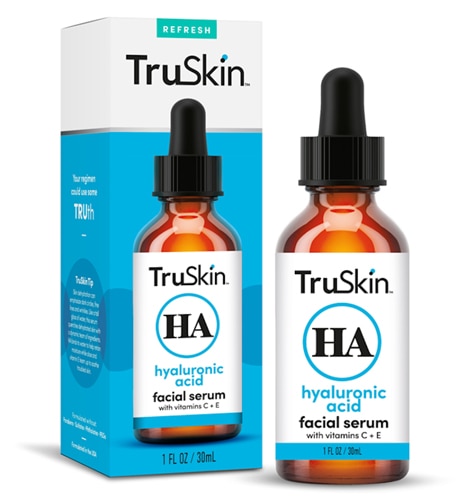Been looking for an ingredient to give you a dewy complexion, especially in the throes of winter? Look no further than
hyaluronic acid. While it’s hard to find a skincare ingredient that lives up to its hype, that may actually be the case with hyaluronic acid (HA). Despite the harsh sounding “acid” in its name, HA is safe for everyone, including those with sensitive skin.
Used topically in skincare products, HA has many impressive attributes: It is well tolerated; does not (typically) cause allergic reactions or irritate skin; and itis safe to use on the skin during pregnancy and while breastfeeding. If you have dry skin, or you crave a more dewy, fresher feel to your skin during the cooler months, a serum or moisturizer containing HA can be a savvy choice.

What is hyaluronic acid?
Hyaluronic acid is a naturally occurring glycosaminoglycan that can found throughout the body’s connective tissue. Hyaluronic acid and other glycosaminoglycans play a role in skin elasticity and tone, cell metabolism, regeneration and healing.
Along with
collagen, it’s the main component of what gives your skin structure and it is largely responsible for increasing hydration in the skin. Naturally occurring hyaluronic acid is bound to collagen on one side and links to water molecules on the other, giving skin its plumpness.
HA’s superpower is how much water it can bind to—it’s reported to be able to bind up to 1,000 times its weight in water. An extreme humectant, HA delivers on plumpness. Keep in mind, however, that topical HA provides hydration on a surface level, and can’t treat deep wrinkles.
What does hyaluronic acid do?
As you age, you lose collagen and hyaluronic acid naturally. Your skin more easily becomes dehydrated. Coupled with harsh weather, heaters during the wintertime, irritating skin-care products and tiny breaks in the protective skin barrier that happen over time, and you have the perfect storm for a complexion crisis.
HA counteracts the loss of moisture by serving as a cushioning and lubrication agent for not only your skin, but your joints, nerves, hair and eyes.
When applied to the surface of the skin, hyaluronic acid serums can reduce wrinkles, redness and dermatitis. It can help your skin feel smoother and suppler. And who doesn’t want some of that?
Who should use hyaluronic acid?
Hyaluronic acid is easy on all skin types. In general, dry and mature skin will benefit the most from using hyaluronic acid. Replacing hyaluronic acid topically as you age will have the most impact on the middle-aged and older.
How to use hyaluronic acid
A strong hyaluronic acid product should do a good job of pulling moisture to the surface of your skin. Don’t overdo it by using more than one HA product in your routine. Also, hyaluronic acid, used incorrectly, can dehydrate your skin. The molecule needs water to plump, but without any moisture on the surface of your skin or from the air, it will pull the water from deep inside your skin.
Try applying the serum on damp skin, then quickly topping it with a cream. Or you can spritz your skin with
rose water or another
toner, then apply. You can take a
hyaluronic acid supplement, too but consult with your healthcare provider before you do so. It's most popularly used as a topical treatment like a serum or gel lotion, but it's also used as a supplement, and for those who feel like they need a more extreme skin intervention, for filler injections.
What to look for
Look for hyaluronic acid or sodium hyaluronate on your skincare product's ingredient label. Sodium hyaluronate is a salt derived from hyaluronic acid. The biggest difference between the two? Sodium hyaluronate absorbs into the skin much more readily than hyaluronic acid does.
For best results, you’ll want 1 percent or higher of hyaluronic acid in your skincare product. If the strength of the HA is too diluted, it won’t perform as well. If a product doesn't show the percentage of hyaluronic acid, aim for HA to be relatively high on the ingredients deck rather than one of the last listed.
Hyaluronic acid products to try
Here are a few of our favorite HA products:
A very concentrated HA serum formulated to have a big impact on fine lines and wrinkles. $48, vitacost.com
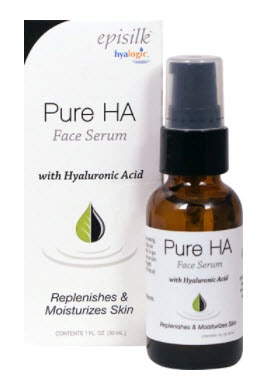
A mix of hyaluronic acid, squalane, and new sugar technology, this moisturizer can help the cause of smoother, softer, younger-looking skin. $10, vitacost.com
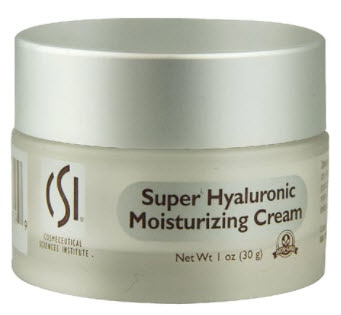
Get HA and SPF with this skin renewal cream that adds in ceramides and squalene for extra nourishment. $22, vitacost.com
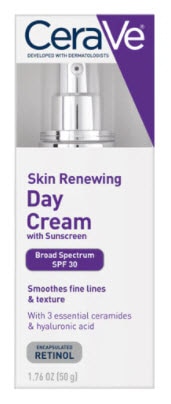
Feather light but concentrated for results, this pre moisturizer layer infuses skin with hydration. $23, vitacost.com

Internal supplements of HA may support your skin’s capacity to hold water. As a "water-loving" molecule, HA plays a crucial role in lubrication, both inside and out. One
study found that doses of 120–240 mg per day for at least one month have been shown to significantly increase skin moisture and reduce dry skin in adults.
† $23, vitacost.com
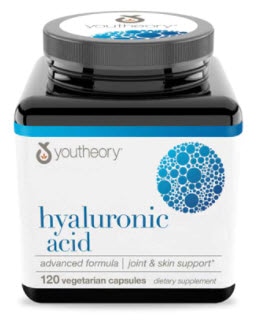 †These statements have not been approved by the Food and Drug Administration. These products are not intended to diagnose, treat, cure or prevent disease.
†These statements have not been approved by the Food and Drug Administration. These products are not intended to diagnose, treat, cure or prevent disease.
 †These statements have not been approved by the Food and Drug Administration. These products are not intended to diagnose, treat, cure or prevent disease.
†These statements have not been approved by the Food and Drug Administration. These products are not intended to diagnose, treat, cure or prevent disease.



